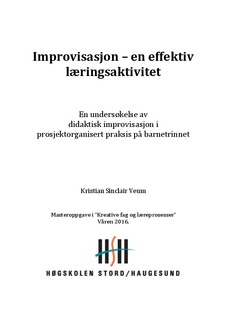| dc.description.abstract | Experienced teachers are often perceived as skillful performers of improvisational
activities in the classroom. The student teacher has a narrower basis for carrying
out the activity with the same level and quality of improvisation due to the lack of
experience and repertoire. A key question is: Does the student teacher improvise
at all? Furthermore, how can this improvisational activity be described? This study
aims at describing improvisational teacher knowledge and skills. The study uses
principles from an exercise within improvisational theater performance.
Furthermore, the study examines how student teachers and experienced teachers
use teacher knowledge and skills in project based practice. The practice is an area
where student creativity is fostered to a larger degree. The study attempts to
explain how student teachers and experienced teachers apply this individually, but
also in relation to each other. The research questions are as follows:
1. How can one describe improvisational teacher knowledge and skills in
music pedagogic practice?
2. How do teachers and student teachers use improvisational teacher
knowledge and skills in project-organized practice?
Findings show that experienced teachers use structures and frameworks
effectively to create an open space where the pupil in guidance with the teacher,
are given the opportunity to discuss curricular goals and conceptual
comprehension. The teacher applies different approaches and examples to
progress the conversation, so that the students can develop their own ideas in a
creative process. The dialogue is open for student input, and the teacher progress
the conversation based on the student input. By doing this, the teacher can control
the conversation through an open dialogue guide. On the other hand, the student
teacher lacks both experience and repertoire to teach with the same level of
flexibility and structures as the experienced teacher. A more one-way4
conversation dominates the way the student teacher teaches. Generally, it is
observed that the student teacher controls the conversation with a closed dialogue
guide, because the conversation does to a much lesser degree allow for input and
adaptive development. The student teacher does, however, show tendencies
towards an open dialogue guide but stalling at an early phase of the conversation.
The discussion suggests that the teacher education needs to incorporate the term
¨improvisation¨, viewed as an effective teaching activity, towards conceptual
knowledge. The term improvisation, and improvisation as an activity, should be a
subject that is both discussed and exercised in practice. | nb_NO |
